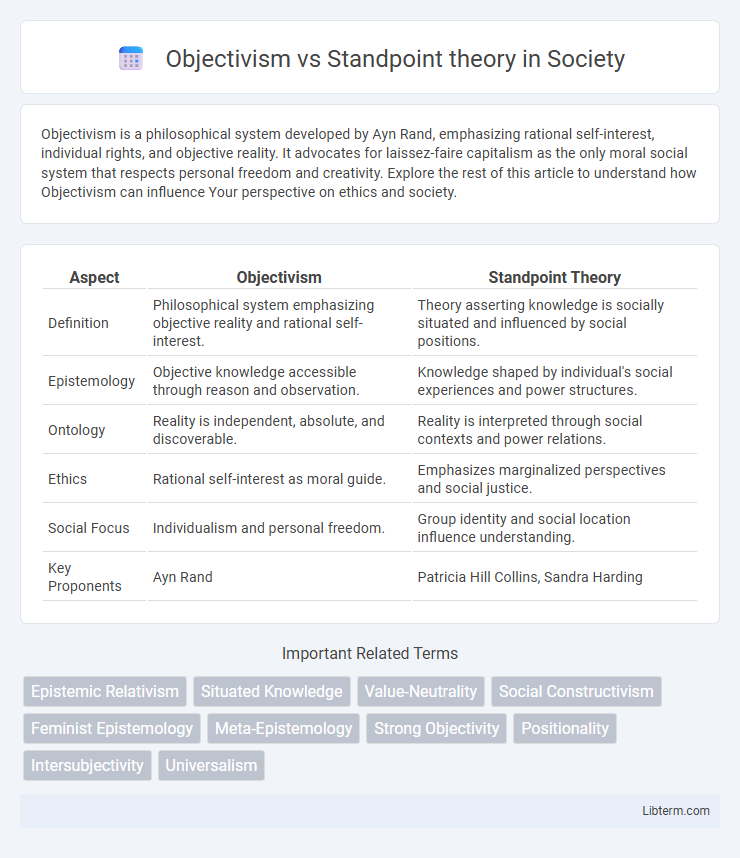Objectivism is a philosophical system developed by Ayn Rand, emphasizing rational self-interest, individual rights, and objective reality. It advocates for laissez-faire capitalism as the only moral social system that respects personal freedom and creativity. Explore the rest of this article to understand how Objectivism can influence Your perspective on ethics and society.
Table of Comparison
| Aspect | Objectivism | Standpoint Theory |
|---|---|---|
| Definition | Philosophical system emphasizing objective reality and rational self-interest. | Theory asserting knowledge is socially situated and influenced by social positions. |
| Epistemology | Objective knowledge accessible through reason and observation. | Knowledge shaped by individual's social experiences and power structures. |
| Ontology | Reality is independent, absolute, and discoverable. | Reality is interpreted through social contexts and power relations. |
| Ethics | Rational self-interest as moral guide. | Emphasizes marginalized perspectives and social justice. |
| Social Focus | Individualism and personal freedom. | Group identity and social location influence understanding. |
| Key Proponents | Ayn Rand | Patricia Hill Collins, Sandra Harding |
Introduction to Objectivism and Standpoint Theory
Objectivism asserts that reality exists independently of consciousness, emphasizing objective knowledge through reason and empirical evidence. Standpoint theory argues that knowledge is socially situated, highlighting how marginalized groups' perspectives reveal unique insights overlooked by dominant viewpoints. These contrasting epistemologies shape debates about the nature of truth and the inclusive scope of knowledge.
Historical Background and Philosophical Roots
Objectivism, founded by Ayn Rand in the mid-20th century, is rooted in classical liberalism and emphasizes rational self-interest, individualism, and objective reality as accessible through reason. Standpoint theory emerged from feminist epistemology in the 1970s, largely influenced by scholars like Sandra Harding and Patricia Hill Collins, highlighting how knowledge is socially situated and shaped by power dynamics and marginalized perspectives. While Objectivism asserts universal truths independent of social context, Standpoint theory critiques this view by arguing that historical and social positions fundamentally influence one's understanding of truth and knowledge.
Core Principles of Objectivism
Objectivism, founded by Ayn Rand, emphasizes rational self-interest, objective reality, and individual rights as its core principles. It asserts that reality exists independently of consciousness, and humans gain knowledge through reason, rejecting subjective influence. Objectivism advocates for laissez-faire capitalism as the only moral social system, upholding personal freedom and property rights as essential for human flourishing.
Fundamental Tenets of Standpoint Theory
Standpoint theory asserts that knowledge is socially situated and emphasizes the importance of marginalized perspectives as sources of insight into power dynamics. It challenges the objectivist claim of universal, context-independent knowledge by highlighting how social positions shape understanding and truth claims. Central tenets include the emphasis on epistemic privilege for oppressed groups and the recognition that power relations influence cognitive processes and knowledge production.
Epistemological Approaches: Objective Truth vs Situated Knowledge
Objectivism asserts that knowledge reflects an objective reality independent of individual perspectives, emphasizing universal truths accessible through reason and empirical evidence. Standpoint theory argues that knowledge is inherently situated, shaped by social positions and experiences, highlighting the epistemic privilege of marginalized groups in revealing biases within dominant paradigms. This epistemological clash centers on whether truth is absolute or contingent upon the observer's context and power dynamics.
Role of Perspective in Knowledge Creation
Objectivism asserts that knowledge is an unbiased reflection of reality, independent of individual perspectives, emphasizing universal truths accessible through reason and observation. Standpoint theory argues that knowledge is inherently shaped by social positions and experiences, highlighting how marginalized perspectives reveal insights obscured by dominant views. The contrast underscores the role of perspective as either a distortion to be eliminated or a vital source of critical understanding in knowledge creation.
Implications for Social Justice and Power Dynamics
Objectivism emphasizes universal truths and individual rationality, often prioritizing objective reality over subjective experiences, which can lead to critiques regarding its capacity to address systemic social injustices rooted in power imbalances. Standpoint theory centers marginalized perspectives, asserting that knowledge is socially situated and highlighting how power dynamics shape what is considered valid truth, thereby framing social justice as dependent on recognizing and valuing diverse experiences. These contrasting epistemologies influence social justice strategies: Objectivism may favor equal application of universal principles, whereas Standpoint theory advocates for power-redistributive approaches that amplify oppressed voices to achieve equity.
Critiques of Objectivism and Standpoint Theory
Critiques of Objectivism argue that its claim to universal, context-independent truth overlooks the influence of social positions and power dynamics on knowledge. Standpoint Theory is criticized for potentially relativizing truth by suggesting that all knowledge is situated and influenced by social identities, which can lead to epistemic fragmentation. Both theories face challenges in balancing objective standards with the recognition of diverse, situated perspectives on knowledge production.
Applications in Contemporary Research and Society
Objectivism, emphasizing universal truths and independent reality, informs quantitative research methods and policy-making focused on measurable outcomes and standardized knowledge. Standpoint theory highlights the importance of social positions and lived experiences, driving qualitative research approaches and social justice initiatives that prioritize marginalized perspectives. Contemporary applications reveal Objectivism's role in scientific objectivity and global standards, while Standpoint theory shapes participatory research and efforts to address systemic inequalities in society.
Conclusion: Bridging Objectivism and Standpoint Perspectives
Bridging Objectivism and Standpoint Theory involves recognizing the value of objective knowledge while incorporating the influence of social positions on perception and experience. Emphasizing epistemic plurality allows for a more comprehensive understanding by blending universal truths with context-specific insights shaped by individual and group standpoints. This integration fosters a dynamic framework where knowledge is both grounded in reality and informed by diverse lived experiences, promoting inclusivity and critical reflection.
Objectivism Infographic

 libterm.com
libterm.com